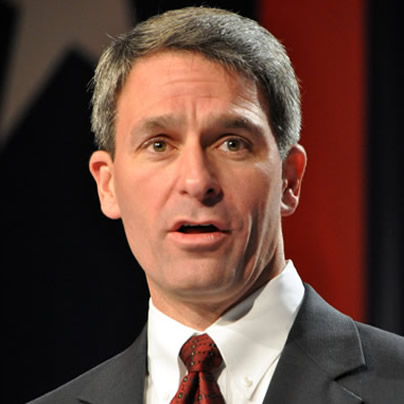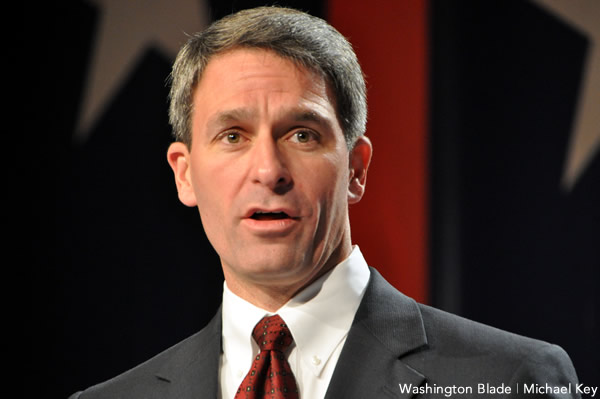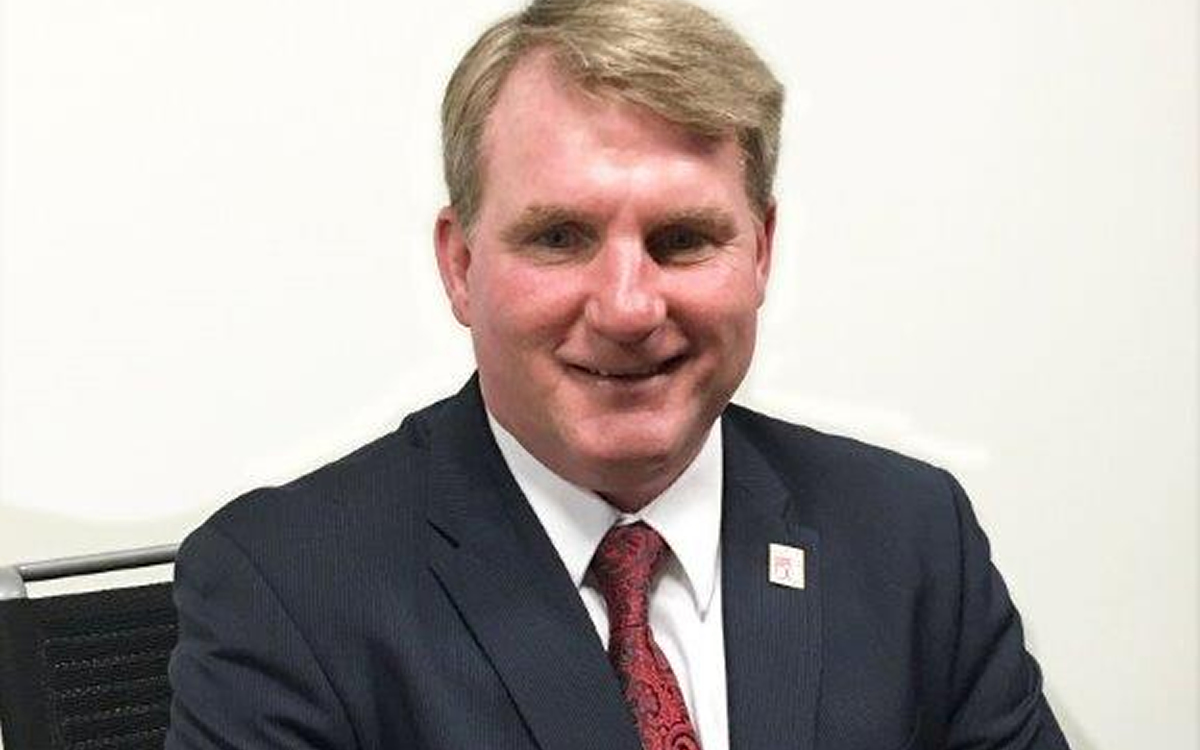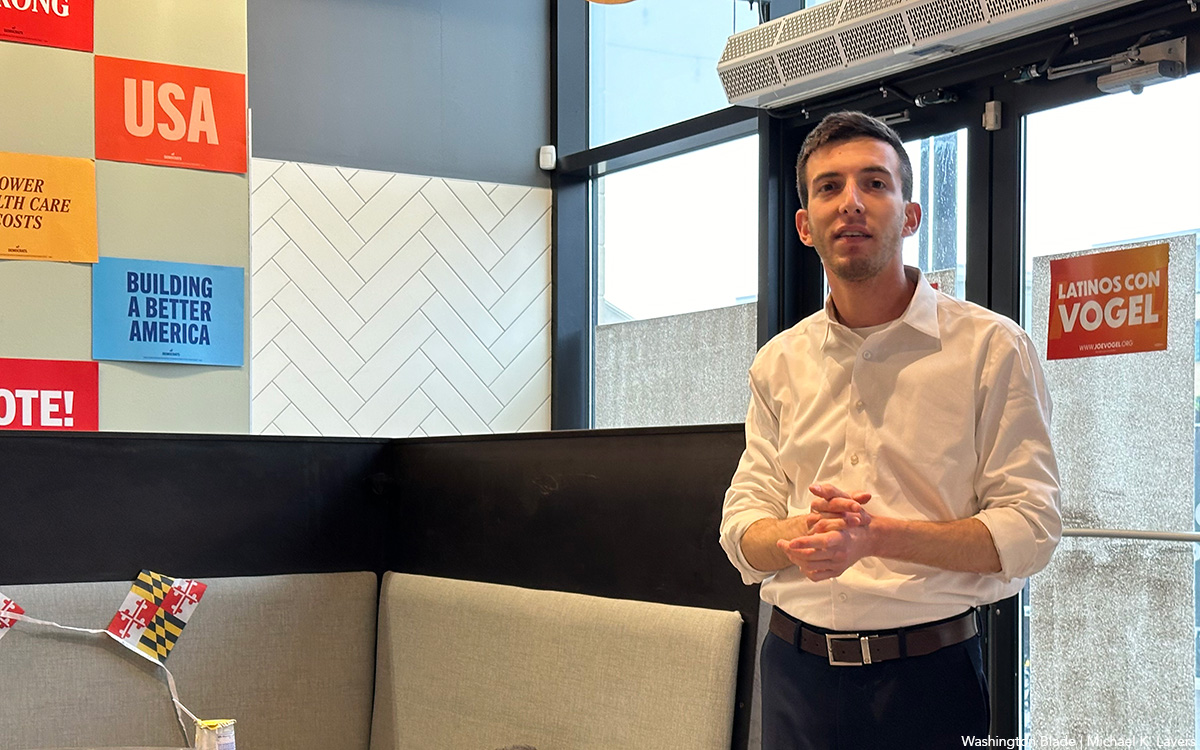Local
Supreme Court denies Cuccinelli appeal of Va. sodomy law ruling
Action upholds lower court ruling striking down law


The high court declined to hear a case brought by Virginia Attorney General Ken Cuccinelli related to the commonwealth’s sodomy law. (Washington Blade file photo by Michael Key)
The U.S. Supreme Court on Monday denied a petition by Virginia Attorney General Ken Cuccinelli seeking to appeal a lower court ruling declaring the state’s Crimes Against Nature or sodomy law unconstitutional.
By refusing to hear the case, the high court allowed a decision in March striking down the law by the Fourth Circuit U.S. Court of Appeals in Richmond to stand, ending efforts by Cuccinelli and other officials to get the state’s ban on oral and anal sex between consenting adults reinstated.
“Under any circumstances this is definitely a victory and it’s a good one,” said Claire Gastanaga, executive director of the ACLU of Virginia. “It puts to rest this idea that somehow you can have a statute that’s found unconstitutional but you can still be prosecuted under it.”
Gastanaga was referring to the Supreme Court’s landmark 2003 decision of Lawrence v. Texas that overturned state sodomy laws. A three-judge panel of the Fourth Circuit Court of Appeals cited the Lawrence decision as the basis for its decision in March to overturn Virginia’s Crimes Against Nature statute, saying it could no longer be enforced under any circumstances.
Cuccinelli has contended that the Lawrence decision doesn’t apply to cases involving sex between adults and minors. As a candidate for governor, Cuccinelli launched a special campaign website earlier this year claiming removal of the sodomy law would prevent law enforcement officials from prosecuting “child predators.”
LGBT rights attorneys have disputed that claim, saying existing state laws enable police and prosecutors to arrest and prosecute anyone who sexually abuses a minor.
The Fourth Circuit appeals court decision struck down a felony conviction by a judge in the city of Colonial Heights, Va., of a 47-year-old man for soliciting oral sex from a 17-year-old woman. Although no sex took place, the defendant, William Scott MacDonald, had been charged with soliciting someone to commit a sexual act that his attorneys argued was no longer illegal under the Lawrence decision.
In its 2-1 ruling, the appeals court panel declared that the Lawrence decision invalidated the Virginia Crimes Against Nature law as “facially” unconstitutional, preventing it from being enforced, even in cases of consensual sodomy between an adult and a minor if the minor is between the ages of 15 and 18. The judges noted that the age of sexual consent in Virginia is 15.
Cuccinelli’s office issued a statement on Monday saying the elimination of the sodomy law “puts tools prosecutors need to protect children in jeopardy.”
According to the statement, Cuccinelli’s efforts to keep the law on the books “was never about sexual orientation or private acts between consenting adults” but instead was about enabling law enforcement officials to “prosecute child predators.”
Attorneys familiar with the case — including prosecutors in Arlington and Alexandria — have said existing state laws give law enforcement officials the ability to prosecute all cases of forcible or coerced sex between an adult and a minor as a felony. They say that heterosexual intercourse between a minor within the age range of 15 through 17 and an adult can still be prosecuted as a misdemeanor. But with the elimination of the state sodomy law, consenting oral or anal sex among minors — gay or straight — between age 15 and 17 and an adult is fully legal and can’t be prosecuted until or unless the legislature changes the law.
Gastanaga and others familiar with Cuccinelli’s concerns have called on the Virginia General Assembly to revise the existing laws addressing the age of consent or sex with minors in a way that doesn’t violate the Constitution as spelled out in the Lawrence decision.
“That means you’ve got to do the hard work of getting together with the Commonwealth’s Attorneys and public defenders and other criminal defense lawyers and legislators and people like us and try to work out something that does address what you want to address, which is sexual activity that is not constitutionally protected,” Gastanaga said.
James Parrish, executive director of the statewide LGBT group Equality Virginia, said his organization would not oppose legislation that reforms existing laws to address potential problems resulting from the striking down of the sodomy law.
“This is something the Supreme Court decided now more than 10 years ago,” Parrish said. “We understand that the attorney general and others have some concerns of how the sodomy law was intertwined with other laws. They have had 10 years to make those laws more clear and we would hope they would work with the General Assembly to address these concerns” in a way that doesn’t violate the Lawrence decision’s protections pertaining to consenting adults, he said.
Although Cuccinelli criticized his Democratic opponent, businessman Terry McAuliffe, for expressing support for overturning the Virginia sodomy law, McAuliffe was leading Cuccinelli by a 42 to 37 percent margin in one of the most recent public opinion polls conducted by Virginia’s Hampton University.
Josh Schwerin, McAuliffe’s press secretary, said Cuccinelli demonstrated “an extreme agenda and uncompromising approach” by refusing in the past to support legislation to update Virginia’s laws to conform to the Supreme Court ruling on sodomy.
“Everyone supports strong laws to protect children and, like most Virginians, Terry believes our law should be updated to both conform with court rulings and allow prosecution of predators,” Schwerin said. “As he admitted as recently as 2009, Ken Cuccinelli is one of the only elected officials in America who believes that being gay should result in criminal prosecution and jail time,” he said.
Under the Supreme Court’s rules, at least four of the court’s nine justices must vote to hear a case in order for the court to consider a case on its merits. The court never discloses how individual justices vote or what the vote count was when it decides whether or not to take a case.
However, in August Supreme Court Chief Justice John Roberts issued a ruling denying a separate petition by Cuccinelli asking the court to put a stay on the Fourth Circuit Court of Appeals ruling striking down the Virginia sodomy law until the Supreme Court decided whether or not to take the case. Roberts did not issue an explanation for denying Cuccinelli’s request for a stay.
District of Columbia
Taste of Point returns at critical time for queer students
BIPOC scholar to speak at Room & Board event on May 2

The Point Foundation will kick off May with its annual Taste of Point DC event. The event will be hosted at Room & Board on 14th Street and feature a silent auction, food tastings, a speech from a scholar, and more.
Point’s chief of staff, Kevin Wright, said that at Taste of Point, the scholars are the star of the show.
“People never come to an event to hear Point staff speak, they come to hear from the people most impacted by the program,” he said. “At its core Taste of Point is designed to center and highlight our scholars’ voices and experiences.”
This year, a Point BIPOC Scholar, Katherine Guerrero Rivera will speak at the event.
“It is a great opportunity to highlight the scholars out there on the front lines making impacts in almost every sector and job field,” Wright said.
Wright pointed out that this year especially is a pivotal time for LGBTQ students.
“In 2023, there were 20 states that passed anti-LGBTQ legislation,” he said. “By this point in [2024] we already have more.”
Wright said the impacts of those legislative attacks are far reaching and that Point is continuously monitoring the impact they have on students on the ground.
Last month, The Washington Post reported that states with anti-LGBTQ laws in place saw school hate crimes quadruple. This report came a month after a non-binary student, Nex Bennedict, died after being attacked at school.
“So, we see this as a critical moment to really step up and help students who are facing these challenges on their campus,” Wright said. “Our mission is to continue to empower our scholars to achieve their full academic and leadership potential.”
This year Point awarded nearly 600 LGBTQ students with scholarships. These include the flagship scholarship, community college scholarship and the BIPOC scholarship. When the foundation started in 2002, there were only eight scholarships awarded.
Dr. Harjant Gill is one of those scholars who said the scholarship was pivotal for him. Gill said he spent his undergraduate years creating films and doing activism for the LGBTQ community.
As a result, his academic record wasn’t stellar and although he was admitted into American University’s graduate program he had no clue how he would fund it.
Upon arrival to American he was told to apply for a Point scholarship and the rest was history.
“It ended up being the one thing that kept me going otherwise I would have dropped out,” he said. “Point was incredibly instrumental in my journey to becoming an academic and a professor.”
More than a decade later, Gill serves on the host committee for Taste of Point and is a mentor to young Point scholars. He said that he donates money yearly to Point and that when he is asked what he wants for a gift he will often tell his friends to donate too.
To attend the event on Wednesday, May 2, purchase tickets at the Point website. If you can’t attend this year’s Taste of Point DC event but would like to get involved, you can also donate online.
District of Columbia
Three of five LGBTQ candidates win race for DNC delegate from D.C.
32 candidates competed for 13 elected seats in party caucus

Three out of five known LGBTQ candidates running for election as delegates from D.C. to the Democratic National Convention won their races at an April 20 Democratic Party caucus election held at D.C.’s Walter Washington Convention Center.
Ward 2 gay Democratic activist John Fanning finished in first place with 140 votes and Ward 8 gay Democratic activist David Meadows finished in second place with 127 votes in a race in which six male candidates committed to supporting President Biden were competing for three male seats in a section of the city designated as Congressional District 1, which included registered Democratic voters in Wards 1, 2, 6, and 8.
Ward 7 gay Democratic activist Jimmie Williams won his race, finishing in third place with 200 votes in a race in which eight male candidates committed to President Biden competed for four male seats in the Congressional District 2 section of the city that included Wards 3, 4, 5, and 7.
Gay Democratic activist Felipe Afanador lost his race, finishing in sixth place with 47 votes in the Congressional District 2 election for male candidates backing Biden. It couldn’t immediately be determined which of the four wards in District 2 he is from.
The Washington Blade didn’t learn about Afanador’s status as an LGBTQ candidate until the Capital Stonewall Democrats announced it one day before the April 20 party election in an email statement.
In the Congressional District 2 race among female candidates, in which eight candidates competed for three female seats, transgender rights advocate and Ward 3 Democratic Party activist Monika Nemeth lost her race, finishing in sixth place with 49 votes.
The five LGBTQ candidates were among 32 candidates competing for just 13 elected delegate positions in D.C. D.C. will have a total of 51 delegates to the Democratic Convention, but the other 38 include elected officials and party leaders who are considered “automatic” or appointed delegates. The Democratic Convention will be held in Chicago Aug. 19-23.
Observers familiar with the April 20 party caucus election said Fanning, Meadows, and Williams had participated in local D.C. Democratic Party events and activities for a longer period than Nemeth and Afanador and appear to have been better known among Democratic voters in their respective wards as well as other wards. Those factors contributed to their receiving significantly more votes than most other candidates, observers have said.
In his candidacy statement posted on the D.C. Democratic Party website, Afanador said he worked on the 2020 Biden presidential election campaign in Pennsylvania. His LinkedIn page says in 2022 he began work in Washington for the Biden administration as an official in the U.S. Department of Agriculture.
Nemeth is a past president of D.C.’s Capital Stonewall Democrats, the city’s largest LGBTQ local political group, and has been an active member of the D.C. Democratic State Committee, the local party governing body. She served as a Biden delegate at the 2020 Democratic National Convention.
“It is important for our D.C. delegation to have strong LGBTQ representation,” Capital Stonewall Democrats said in its April 19 statement. “There are five LGBQ candidates running to be delegate, and Capital Stonewall Democrats asks that our members support each one,” the statement says.
“Unfortunately, they fell short, but they and all queer Democrats are welcome to attend and participate in convention events and activities sponsored by the national and local party,” Meadows told the Blade in referring to Nemeth and Afanador. “Our shared goal is to unite behind the Biden-Harris ticket to protect our LGBTQ rights from being dismantled by Donald Trump and the GOP,” Meadows said.
“Running for District Delegate is one of the most grassroots efforts,” Fanning told the Blade. “It’s very beneficial to align yourself on a slate with community leaders that have either previously run for District Delegate or have developed a constituency in their community from other civic engagements,” he said, referring to possible reasons for his, Meadows, and Williams’s election victory.
Aside from the D.C. elected LGBTQ delegates, two prominent D.C. LGBTQ Democratic leaders will be appointed as delegates to the 2024 Democratic National Convention in their role as members of the Democratic National Committee from D.C. They are Claire Lucas, a highly acclaimed Democratic Party and LGBTQ rights advocate and party fundraiser; and Earl Fowlkes, one of the lead organizers of D.C.’s annual Black LGBTQ Pride celebration and former president of the Capital Stonewall Democrats. Both are committed to supporting President Biden as the Democratic nominee for re-election.

GAITHERSBURG, Md. — Maryland state Del. Joe Vogel (D-Montgomery County) on Friday held a “Big Gay Canvass Kickoff” event at his congressional campaign’s headquarters.
LGBTQ+ Victory Fund Vice President of Outreach and Engagement Marty Rouse and John Klenert, a member of the DC Vote and Victory Fund Campaign board of directors, are among those who participated alongside members of Equality PAC. Vogel spoke before Rouse, Klenert and others canvassed for votes in the area.
“Joe brings a fresh new perspective to politics,” said Gabri Kurtzer-Ellenbogen, deputy field director for Vogel’s campaign.
Vogel, 27, is among the Democrats running for Congressman David Trone’s seat.
Trone last May announced his bid to succeed retiring U.S. Sen. Ben Cardin (D-Md.) in the U.S. Senate.
The Democratic primary is on May 14. Vogel would be the first Latino, the first gay man and first Gen Zer elected to Congress from Maryland if he were to win in November.
“We need a new generation of leadership with new perspectives, new ideas, and the courage to actually deliver for our communities if we want things to get better in this country,” Vogel told the Washington Blade last month during an interview in D.C.
-

 South America3 days ago
South America3 days agoDaniel Zamudio murderer’s parole request denied
-

 Maryland4 days ago
Maryland4 days agoMontgomery County police chief discusses arrest of trans student charged with planned school shooting
-

 Politics5 days ago
Politics5 days agoCourt records raise concerns about right-wing TikTok investor’s influence
-

 Commentary4 days ago
Commentary4 days agoWorld ‘isn’t much different today’












